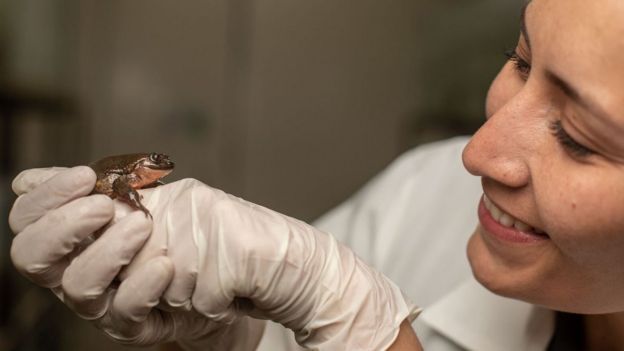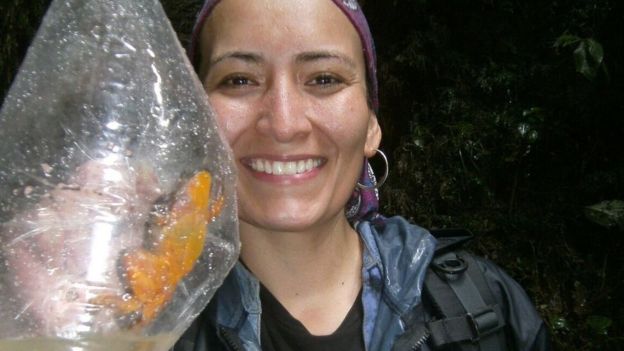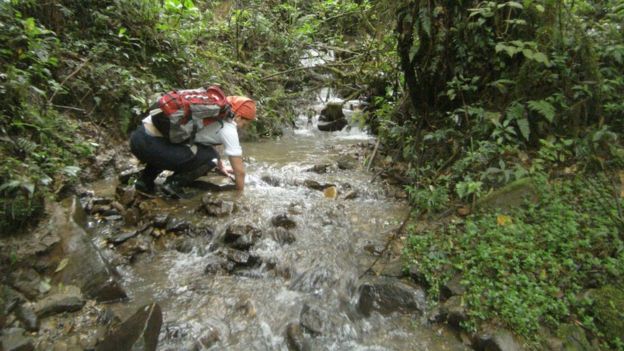A frog believed to be the last of his kind in the world has been granted a reprieve from solitude.
Romeo, known as the world's loneliest frog, has spent 10 years in isolation at an aquarium in Bolivia.
Scientists say they have found him a Juliet after an expedition to a remote Bolivian cloud forest.
Five Sehuencas water frogs found in a stream were captured, with the goal of breeding and re-introducing the amphibians back into the wild.
Teresa Camacho Badani is chief of herpetology at the Museo de Historia Natural Alcide d'Orbigny in Cochabamba City and the expedition leader.
She is optimistic that opposites will attract, even in frogs: "Romeo is really calm and relaxed and doesn't move a whole lot," she told BBC News. "He's healthy and likes to eat, but he is kind of shy and slow."
Juliet, however, has a very different personality. "She's really energetic, she swims a lot and she eats a lot and sometimes she tries to escape."
The five frogs - three males and two females - are the first Seheuncas water frogs to be seen in the wild for a decade, despite previous searches in the Bolivian wilderness.
Romeo was collected 10 years ago when biologists knew the species was in trouble, but was not expected to remain alone for so long.
He attracted international attention a year ago over his search for a mate, and was even given a dating profile.
Race to find mate for 'lonely' frog
The newly discovered frogs are now in quarantine at the museum's conservation centre, where the race is on to stop the species from becoming extinct.

Juliet with Teresa Camacho Badani
Sehuencas water frog: The facts
- An aquatic frog (Telmatobius yuracare) that was once abundant in the small streams, rivers and ponds of the montane cloud forest of Bolivia
- Water frogs are declining rapidly in Bolivia, Ecuador and Peru
- They face a combination of threats, including climate change, habitat destruction and the introduction of invasive trout

Chris Jordan of Global Wildlife Conservation, which is supporting conservation efforts, said there is risk to taking animals into captivity.
However, there are too few of the frogs in the wild to maintain a viable population in the long term, he said.
"We have a real chance to save the Sehuencas water frog - restoring a unique part of the diversity of life that is the foundation of Bolivia's forests, and generating important information on how to restore similar species at grave risk of extinction."

More frogs were found on an expedition
The re-discovered frogs will be treated to protect against an infectious disease, chytridiomycosis, which is wiping out amphibians around the world.
Romeo will then meet Juliet, in an attempt to produce offspring that can eventually be put back into their natural habitat.
In Bolivia, 22% of amphibian species face some degree of extinction threat, from habitat loss, pollution and climate change.

Searching the streams for frogs
Teresa Camacho Badani says Romeo's story is important to draw attention to the plight of amphibians.
They did not find any other water frogs in adjacent streams, raising worrying questions about the health of the ecosystem.
"It's a really good opportunity to use Romeo to help understand those threats, help understand how to bring those species back from the brink but also at the same time to take advantage of the global profile that Romeo and his species has now," she said.
Other amphibians such as the Mallorcan midwife toad in Spain and the Kihansi spray toad of Tanzania have been bred and reintroduced from just a few individuals in the past.
"They provide hope in the context of this sixth mass extinction that there are solutions to maintain our wonderful biodiversity, to protect endangered and even extinct-in-the-wild species and bring them back and restore some of the beauty of these ecosystems," said Chris Jordan.
All species are important and should not be underestimated as their DNA represents millions and millions of years of evolution, he added.
Latest Stories
-
Shatana drops new single “Monicitamol” to inspire women
7 minutes -
Mahama calls on party supporters, and others fomenting trouble to act responsibly
8 minutes -
We’ll have 2 holidays for Eid al-Fitr celebrations this year – Mahama
14 minutes -
Effiduasi market women hit streets in demand for access to stalls after paying contractor
35 minutes -
GNAT urges gov’t to prioritise education sector challenges just as it’s tackling energy issues
37 minutes -
Free SHS can’t continue; parents must pay for feeding, accommodation – NAGRAT President
42 minutes -
Mahama demands update from IGP on election-related deaths in 2020, 2024
49 minutes -
It’s a boy! Moses Bliss and wife welcome first child
1 hour -
Motorists stranded as fuel shortage hits Damongo
1 hour -
Fuel shortage hits Yendi and Damongo, residents appeal for swift intervention
1 hour -
Prof Bokpin endorses Finance minister-designate’s push for additional IMF funding
2 hours -
Sammy Crabbe criticises NPP leadership for party’s defeat; eyes chairmanship in 2026
2 hours -
There’s no formula for how a President decides to roll out his appointees – Dr Osae-Kwapong
2 hours -
Parliament suspends sitting for committee to vet ministerial nominees; orient new legislators
2 hours -
Close SHSs to address feeding, other issues – PTAs tell government
3 hours

